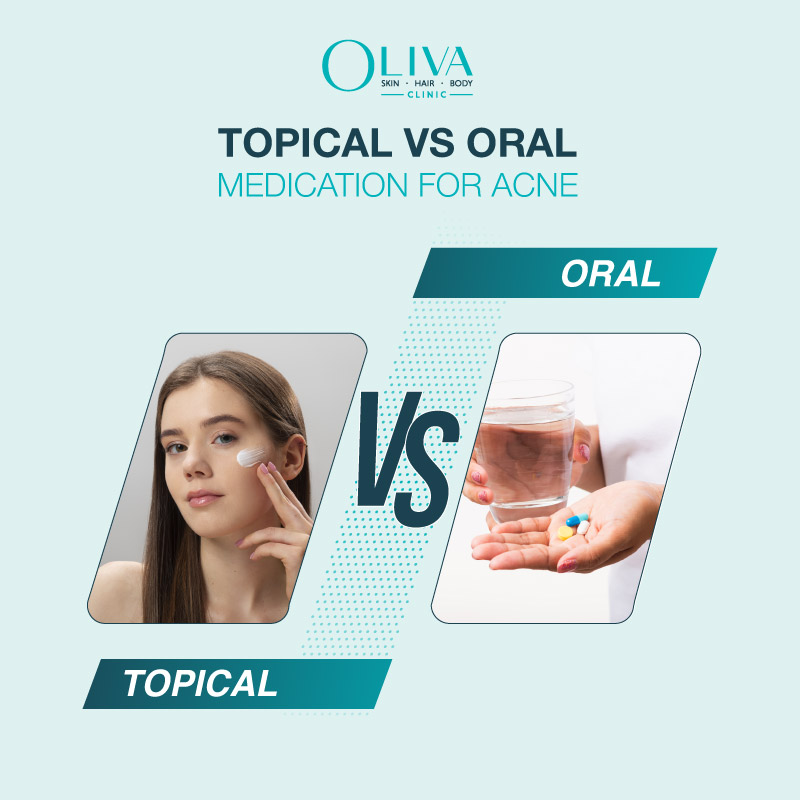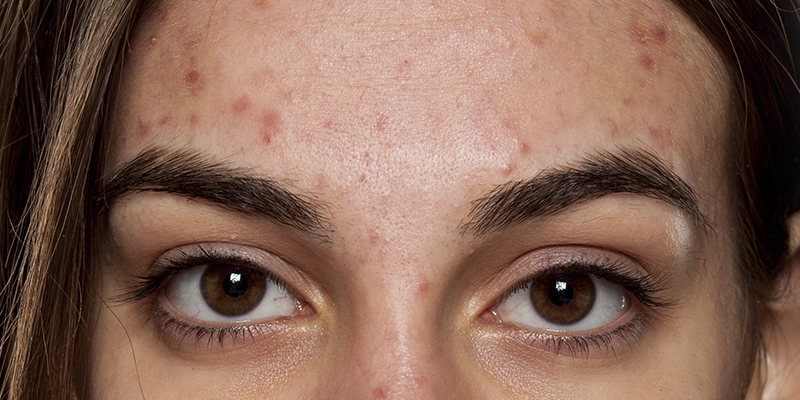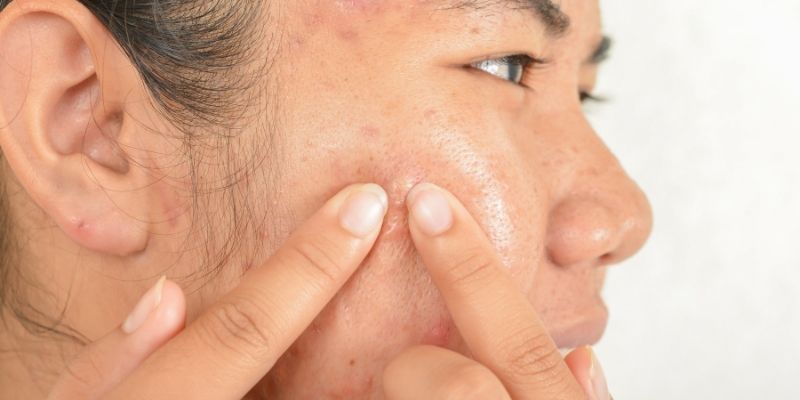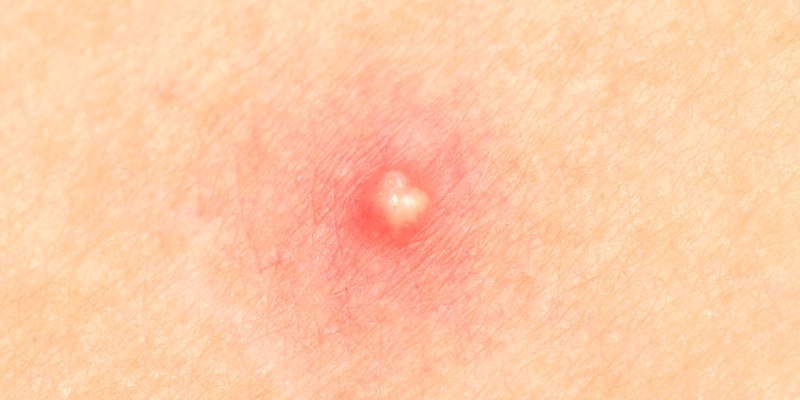Topical vs Oral Medication for Acne: Which Treatment Works Best?
Acne occurs when hair follicles become clogged with oil, dirt, debris and dead skin cells, resulting in blackheads, whiteheads, pimples and sometimes, painful cysts. Choosing the right treatment is crucial because an effective approach can clear current breakouts, prevent future ones, and minimise the risk of scarring. Different acne treatments include topical medications, oral medications and in-clinic procedures. The right treatment depends on the individual’s condition. This blog will guide you through topical and oral acne medications and help you make an informed decision about what is best suited for your specific skin type and the severity of your acne.
In This Article

What Are Topical Acne Medications?
Topical acne medications are creams, gels, and lotions that you apply directly to your skin. These contain active ingredients to clear the bacteria, regulate excess oil production and reduce inflammation that lead to acne. While some of these are available over the counter, others need a prescription. The most common ones include antibiotics like clindamycin and erythromycin. Other popular topical treatments include retinoids like tretinoin, adapalene and benzoyl peroxide.
Best For:
Topical treatments are generally most effective for:
- Mild to moderate acne, like blackheads, whiteheads, and inflamed pimples that are not severe or widespread.
- Acne that occurs on the face, neck, chest, or upper back.
Pros:
- Topical medications are less likely to cause major side effects throughout the body compared to oral medications, as they are applied topically.
- Topical treatments target the affected skin only, performing their action precisely where it is needed.
- Dermatologists often recommend using a combination of topical agents, like an antibiotic with benzoyl peroxide or a retinoid, to enhance effectiveness and address multiple factors that contribute to acne formation.
Cons:
- Topical acne medications can take several weeks to a few months to achieve significant improvement.
When topical antibiotics like clindamycin or erythromycin are used alone, they can lead to bacteria becoming resistant over time, making the treatment less effective. This is why they are often prescribed in combination with other agents, such as benzoyl peroxide, which helps prevent resistance.
What Are Oral Acne Medications?
Oral acne medications are drugs (usually, capsules or pills) taken by mouth. Dermatologists generally prescribe oral medications for more severe cases of acne that have not responded well to topical treatments alone. These work by reducing the acne-causing bacteria and inflammation. The most common type of oral medication for acne is antibiotics, such as doxycycline, minocycline, tetracycline and azithromycin. Other oral medications for acne can include hormonal therapies for women and, in severe cases, isotretinoin.
Best For:
Dermatologists usually recommend oral medications for:
- Moderate to severe acne, like inflammatory papules, pustules, nodules, and cysts that are extensive or painful.
- Body acne that occurs mainly on the chest and back.
Pros:
- Oral acne medications help reduce inflammation and cystic acne more quickly than topical treatments.
- They are particularly beneficial for treating acne on the back, chest, and other large areas that are difficult to reach and where topical creams or gels are less effective.
Cons:
- Oral medications can have potential side effects like nausea, stomach upset, or diarrhoea. Some antibiotics, like doxycycline and minocycline, can make your skin more susceptible to sunburn.
- Due to concerns about antibiotic resistance and potential side effects, dermatologists typically prescribe oral antibiotics for a limited duration.
- Overuse or prolonged use of oral antibiotics can lead to antibiotic resistance, making them less effective for both acne and other bacterial infections.
Topical vs Oral Acne Medications: Key Differences
Now that we’ve explored what topical and oral acne medications are individually, it’s time to have a comparative analysis of both. Deciding between a cream and a pill is not always as easy as most assume, as each approach is different. Both oral and topical medications for acne have unique strengths and considerations. Your dermatologist is the right person to choose the most effective treatment approach for your skin and condition. However, understanding their key differences is important. Here is a breakdown of the comparison against crucial factors:
| Crucial Factors | Topical Acne Medication | Oral Acne Medication |
| How it works | Topical acne medications work by targeting acne-causing bacteria, reducing inflammation, unclogging pores, or regulating oil production at the skin’s surface. | Oral acne medications work by reducing bacteria and inflammation from within that affect the skin. |
| Acne type treated | Mild to moderate acne | Moderate to severe acne |
| Application | Direct application to the affected skin areas, typically once or twice daily. | Involves swallowing pills or capsules, usually once or twice daily, depending on the specific medication and dosage, as prescribed by the doctor. |
| Duration of use | Can be used for long-term maintenance until acne is under control. | Dermatologists generally recommend them for short to medium-term use, due to their side effects. |
| Results | Results may take longer to become visible. | Provides faster and more noticeable improvement |
| Convenience | Topical acne medications are less convenient for acne that is widespread or in hard-to-reach areas (back). | More convenient for body acne. |
| Prescription | Most topical acne medications require a prescription from a dermatologist. | All oral acne medications require a prescription from a dermatologist. |
How To Choose The Right Treatment For Your Acne?
Choosing the right acne treatment (topical or oral) is not a one-size-fits-all situation. It’s a personalised approach that varies for individuals depending on several factors. Understanding these is crucial as it can help you and your dermatologist make the most effective decision for your unique skin.
Based on Acne Severity
The type and severity of your acne play a significant role in determining the initial course of action:
- Mild Acne: For mild acne, like blackheads, whiteheads, and a few small pimples, topical treatments are usually the first line of defence. They target acne-causing factors like clogged pores and bacteria. You can apply these directly to the skin and effectively manage mild breakouts.
- Moderate Acne: For moderate acne, like inflammatory papules and pustules, or widespread, dermatologists often recommend a combination approach as the most effective option. This typically involves using both topical medications and oral medications.
- Severe/Cystic Acne: Dermatologists recommend oral medications for severe acne (painful cysts and nodules) that do not respond to topical treatments.
Skin Type and Sensitivities
Your skin type and how it reacts to products are crucial factors for consideration:
- Sensitive Skin: Individuals with sensitive skin need to be cautious with certain topical treatments, especially those containing ingredients like retinoids or benzoyl peroxide, which can cause dryness, redness, and irritation. In such cases, a dermatologist might recommend starting with lower concentrations, less irritating formulations, or exploring alternative topical agents.
- Oral Medications and Their Side Effects: While oral medications can be very effective, they have potential side effects that vary for individuals. Your dermatologist will recommend oral medications for acne after considering your overall health, existing conditions, and other medications to minimise these risks.
Based on Response to Past Treatments
Your history with acne treatments offers valuable clues for future strategies:
When Topicals Have Failed: If you have consistently used topical medications as prescribed for a sufficient period (typically 2-3 months) without significant improvement, it’s a strong indicator that your acne may be more persistent or severe than initially thought. In such scenarios, your dermatologist may suggest incorporating oral options to control the breakouts.
When And Why To Visit A Dermatologist?
Many people try over-the-counter products for acne. However, it is better to consult a dermatologist before taking any topical or oral medications. Sometimes, despite using these medications, you notice no significant change. These are clear signs that it’s time to seek professional help for advanced medical treatments.
Here’s when and why you should consider booking an appointment with an expert:
- If Topical or Oral Medications Aren’t Working: If you’ve been diligently using over-the-counter creams, topicals, or a full course of oral medication, but your acne persists or isn’t improving, it’s a strong signal that you need a more targeted approach.
- If Your Acne Is Spreading: Spreading acne indicates that your current regimen isn’t addressing the problem, and a dermatologist can intervene to stop its progression.
- If Pimples Are Painful, Cystic, or Leave Marks: If your acne consists of deep, painful nodules or cysts, or if your breakouts consistently leave behind dark spots (post-inflammatory hyperpigmentation) or pitted scars, you need immediate dermatological care.
Note
A dermatologist can accurately diagnose and pinpoint underlying causes (like hormonal imbalances, certain medications, or specific lifestyle factors) that contribute to your breakouts. Based on the evaluation, they will create a personalised treatment plan, which can be a combination of different types of medications (topical, oral), in-office procedures, and tailored skincare recommendations without any major side effects.
Advanced Alternatives When Antibiotics Aren’t Enough
A dermatologist offers a scientific, safe, and tailored approach to acne management, helping you achieve clear skin and maintain its health. They might recommend these advanced acne treatments as a standalone or in combination.
- Chemical Peels: Chemical peels involves applying a chemical peel of specified a concentration (as per individual’s needs) for a controlled exfoliation of the top layers of the skin. This process helps get rid of dirt, excess oil, and dead skin cells build-up, and it reveals clear, smooth skin underneath. Chemical peels are ideal for mild to moderate acne.
- Comedone Extraction: In comedone extraction, dermatologists use specialised tools to extract blackheads and whiteheads and minimise the risk of scarring. This treatment is effective for mild acne.
- Intralesional Injections: Dermatologists administer specialised injections to reduce severe inflammation and pain. This in-clinic treatment procedure is effective for severe acne that appears as nodules and cysts.
Why Choose Oliva Clinic For Acne Treatment?
Oliva Clinics is the leading destination for advanced acne treatments. We are known for delivering visible results with specialised care and a hassle-free treatment experience tailored to each skin type.
Discover why Oliva is the most sought-after choice for acne treatment:
- Expert Dermatologists: Oliva has one of the largest teams of highly experienced dermatologists who design custom treatment plans for each client.
- V-Discover Process: Our signature 5-step consultation process ensures a comprehensive assessment of your skin, hair, and body concerns.
- US FDA-Approved Equipment: At Oliva, we use state-of-the-art technology approved by the US FDA.
- Customised Treatment Plans: At Oliva, every treatment is scientifically tailored to your specific needs, ensuring the best possible outcomes.
- High Client Satisfaction: Oliva has an impressive 95% client satisfaction rate.
- Transparent Pricing: There are no hidden charges, ensuring complete transparency throughout your treatment journey.
Takeaway
Both topical and oral medications help in effective acne management only when prescribed appropriately by a dermatologist. The right treatment for acne will always depend on several individual factors, including the severity and location of your acne, as well as your specific skin type and sensitivities. For a truly effective and safe approach, it’s vital to have a professional assessment.
Do you want to get clear, healthy skin? Schedule your personalised consultation with Oliva Clinic’s expert dermatologists today and get a custom treatment plan designed just for you!
Frequently Asked Questions On Topical And Oral Medications For Acne
Yes, dermatologists often combine topical and oral treatments for moderate to severe acne for more effective and comprehensive results.
Topical treatments have a lower risk of whole-body side effects as they act only on the skin.
Dermatologists generally prescribe oral medications for moderate to severe inflammatory acne, including widespread breakouts, nodules, and cysts, especially if topical treatments haven’t been effective.
You should typically use acne medications consistently for at least 6-12 weeks to see noticeable improvements, though some treatments may show results faster or take longer.
It’s generally not recommended to stop treatment abruptly once acne clears. Your dermatologist will likely advise a maintenance plan to prevent recurrence.














